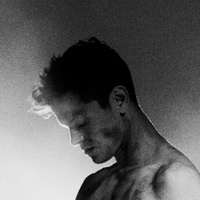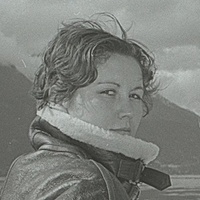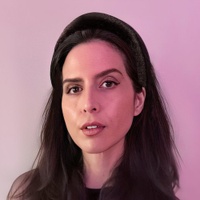As told to Max Freedman, 2579 words.
Tags: Music, Beginnings, Collaboration, Identity, Process.
On just doing it
Musician Perfume Genius (Mike Hadreas) discusses figuring out your artistic identity, learning to collaborate, and transforming ideas into action.Perfume Genius is often discussed as your solo project, but it’s very collaborative. At the very least, Alan [Wyfells, your partner] has been contributing to your music the entire time. Can you talk about the role of collaborators in your creativity?
That’s grown over the years, especially with Alan. When I first started, I had never made music before. I’d never performed before. I had to learn how to do all those things before I could collaborate. Alan has played every show with me since the very beginning, since the first show I’ve ever played. And then, over the years, as I got less shy and more engaged in making things—and not slowly in a hippie way, where I used to be really alone and feel like I need a lot of isolation to write—we’ve started writing together more intentionally and purposefully, especially on the last couple albums. He’s always been there, helping shape the whole thing. Every time I write something, I share it with him first, and we strategize, and things like that together, too.
Since you hadn’t made music before your first album, how did you know this was something you wanted to do?
Just being a fan of music, being an obsessive music nerd. I went to school for painting, and I had written stories and things like that growing up, but I’d never made music. I would try it every once in a while, and it just didn’t work the way other things worked. But music was the thing I was obsessively tracking down. I had really broad tastes, and for all the other things I like, my tastes are smaller.
How did you become comfortable with other folks besides Alan being part of your creative process, and what role do these folks play in your creativity today?
Alan’s the first person I ever sang in front of, and when I went into the studio for the first time, [my other collaborators] became the first people I ever sang in front of. I realized I have this very specific thing that I can do really well, and I don’t need to worry about what happens. Even at shows, if I know I didn’t perform as well, I still know I have something I can bring that other people can’t. It’s not any better or worse than anybody else, but it’s specific to me. When I thought about it like that, I became a lot more confident, not comparing myself to other people as much, because I’m not going to be as technically gifted as some other people, but I have a specific thing I can do.
Sometimes, that thing is really obnoxious to me, and I can barely stand it, but I do know that I’m the only one that can do it. It made me feel more confident performing and collaborating because I wasn’t so self-conscious and defeated if I didn’t do a good job or I couldn’t figure something out. It made me more tenacious to try things.
It sounds like you’re saying that once you come to terms with your own musical identity, it’s a lot easier to not compromise when you’re working with other people, and to use them in service of your vision.
That, yeah. Kind of both ways, a little bit. I’ve always felt like I know when it’s going too far in any direction. If it’s getting away from me, I know. I’m serious and sacred about the things I make, but not how they’re made. I want the process to feel and be good, but I’m not a perfectionist. Some people in the studio are really intense and aggressive. I’m not like that. I wish I was more like that sometimes. I’m kind of a hippie.
There was a period when you were prolific on Substack, publishing surreal writing and hypersexual fan fiction. Now, you haven’t been active on Substack for about a year. Why is that, and what do you think that says about your recent creative headspace?
When I was doing the Substack, that’s all I was thinking about doing. I was only writing in that specific way. I thought when I first started doing it that I was going to write about my process, which I realized I don’t like doing and I’m not good at. I’m good at making things, but not talking about why. I made them because I don’t know how to talk about why. The explanation is the thing I made, but writing in that way is something I’ve been thinking about more recently. I might go back. I don’t know.
My brain moves toward things and away from things, and I’m not very good at doing more than one thing at the same time. I don’t write on tour. I’m either writing an album, or I’m writing all the weird shit I wrote on Substack, or, I started painting again two days ago, and I can’t tell yet if I’m just going to want to do that for however many months.
It sounds like there’s always a creative mode that, whether you need it or just want it, you devote yourself to for a while. Is that correct?
Yeah. I love that because I’m very obsessive. Even when I’m not doing the thing, that’s all I’m thinking about, and I’m basically doing it in my head until I am actually doing the behavior.
When I interviewed you about the Substack in 2021, you said that you enjoy it when people don’t know whether you’re joking about something or earnestly releasing something that could be embarrassing. I’m curious if that still rings true for you and how it’s playing into your creativity today.
Sometimes, those things happen at the same time. I was thinking about when I was writing some of those stories on Substack, and I started out laughing a lot when I was writing them, and then, I would look back on a couple of things and realize, there’s some weird compulsion I have that I’m putting into the story, or some weird, fetish-adjacent idea, or something I’m actually into, that I’m writing about, which can be embarrassing, but also, it’s kind of funny. I’ve been thinking about writing stories again, maybe a collection of stories or a book of some kind. I don’t know.
I also just do it, you know what I mean? I just make shit. 90% of doing anything is doing it. Not to sound self-help-y, but when people are asking me for advice, my first thought is, you should just do it. You beat so many people already if you just actually make a finished thing.
It sounds like you haven’t been focusing on making more music, and you said the same when we spoke in 2021. What about making an album has felt less appealing to you?
It’s not less appealing. I want to not make an album that I’ve already made before, and I don’t want to think about all the things that stress me out, everything else that I’m doing. Making music, there’s a lot of stuff that comes along with it now. It has to sustain me and change my life, and it has to support me and make an impact. It’s more pressurized.
If I want to make a good album, I can’t feel like that, or I have to utilize that pressure in a way that’s good. That always takes a long time for me to figure out. I essentially have to get back to feeling like I’m a little baby to make things that are good. A baby with really good taste. That’s what I think is the best mode.
It takes a while to get rid of stuff and feel like I want to make something that’s surprising and interesting to me, and subversive in some way. I don’t want to reference things I’ve made, or anybody else, intentionally. I know I do all of that without thinking about it, but I want to subconsciously be doing that, not consciously doing it.
It sounds like monetizing or career-izing your music might be posing a challenge. Can you talk more about that?
Well, it’s both. It has also propelled me to be more ambitious, grow, and try new things because I could, and it was fun. If I have money to make a music video, what would a music video that costs money feel like to me? I started playing shows, and I like being nervous. I liked that for one album, the only time this ever happened, the label was like, “Why don’t you write some singles? We don’t feel like there’s a single on this album.” I actually liked that for some reason. I wrote a bunch of songs, and they were the singles, my version of them, on the second album [Put Your Back N 2 It].
Especially after COVID, I had a lot of time to spiral in my head, be really self-aware, and get off the pattern I had been on for so long and be like, “Holy shit, I’m a musician.” Things don’t feel as spontaneous anymore. They feel more like I’m old. Everything just feels different. It doesn’t feel like I’m just on a ride anymore. I feel very much like I’m driving, and that’s scary.
You released your album Ugly Season about two years after your album Set My Heart on Fire Immediately. I believe the original plan was to release them in the reverse order. Can you talk about the artistic decisions behind that?
They were made within a couple of weeks of each other in the studio. We made Ugly Season first, which was a lot more improvisational and very collaborative, with me, Alan, Blake Mills, and Kate [Wallich], the choreographer, and her company. I knew I wanted the music for the dance to be a record. I wanted it to be an album that you would want to listen to separate from the dance.
I was very serious about that, but also a lot more exploratory in the way that we did it. There’s a lot more improvisation in the writing, the recording. We wanted part of this performance to be dark for 10, 15 minutes so I could do three five-minute songs, one 15-minute song. It didn’t need to have a chorus or a bridge or anything. Having those limitations gone changed a lot.
Set My Heart on Fire, which we recorded after, was almost in response to that. I wanted to make a very traditional, in my way, album and have it be very minimal with the least amount of elements. I wanted to play it live. Because Ugly Season has a lot of layers and there was some live improvisation, and just throwing everything at it, with Set My Heart on Fire, I wanted to be starting from a smaller place.
How did you get into dance? What did it take to branch into such a new style?
Kate is just a really good teacher. I can talk with her about ideas that are really expanded, galaxy-brain stoner ideas to me that are still in the bridge between the creative and real life. She understands where I’m coming from, and that was revolutionary to me.
When I started doing the rehearsals for the dance, I started feeling completely insane. There were so many somatic things happening to me. I would be rolling around doing some meditative body dance rehearsal and crying for no reason, or feelings would come up for no reason, or I’d be dancing with everybody and feel kind of high, or have an ecstatic experience, which I thought I was going to have through thinking. I didn’t think it’d be through feeling in my body. It bridged my body and feeling, and thinking about feelings. I thought I was feeling for a long time, but I was just thinking, and I realized I’m not that in touch with my feelings unless I’m making music.
In rehearsal, I was feeling really expansive, creative, and ecstatic. I knew we were eventually going to do this performance, but the performance was everybody’s. It wasn’t just mine. When I was doing the dance, I hadn’t done a creative thing just for me, or just to feel good, for a long time. There’s always so much weight behind it. And that was powerful, too.
When I listen to Ugly Season, even though you can’t read this on the page, it just feels like queerness. I’m curious about that, because on some of your songs before Ugly Season, the lyrics are explicitly queer, but here, it’s just more in the air. How intentional was this?
I think it always has been that, because that’s who I am. I mean, everybody was gay in the dance thing. Not everybody, mostly. If they weren’t, they were, you know what I mean? it literally was in the air more than usual in the dance company.
My secret mission was to never not be doing these really weird, bizarre, cult-like rehearsals. I wanted to get a ranch, have everybody live on it, and just roll around and do weird shit all the time. I had this utopia thing going [on] in my brain, and that’s how I thought of the record too, a soundtrack to that. Lyrically, that’s a lot of the stuff I was thinking about, just a lot about bodies together and transcending that kind of queer shit in a way I didn’t really think about before.
You’re basically describing the “Describe” video.
Oh, 100%. I directed that video, and I made it a snapshot of what I want. Maybe that’s a little embarrassing. I’ve been thinking about that a lot because it’s the most explicitly I’ve ever done that before, or maybe the most conscious I’ve been while I was doing it, like, “Oh, you want to do this? And so you’re making a video where you do it.” But isn’t that what you always do? I’ve gotten in fights about this, where, are my desires really fueling what I make and I’m just more aware of it now, or is it overtaking me?
I’d say that you’re describing awareness of what you always do.
Okay, good. I’m just maybe more transparent about it with myself.
There’s definitely a place where that can tip over to some really icky territory, and I don’t think that will ever happen because I’m so paranoid and hyper-vigilant about that dynamic.
Real life and creative fantasy life started blending together for me in a way that really threw me off and kind of made me manic. Around the dance and making these albums, I was feeling amazing, but I also immediately went to therapy for the first time in years because I was like, “There’s some good things going on, but I need to make sure that I only take the good things going on.”
Perfume Genius Recommends:
5 shows I loved this year
Diles Que No Me Maten at Teatro Lúcido in Mexico City
Debit at the Lodge Room in LA
Leya at Public Records in NYC
Circuit Des Yeux at Pico Union in LA
Gilla Band at Teragram in LA




